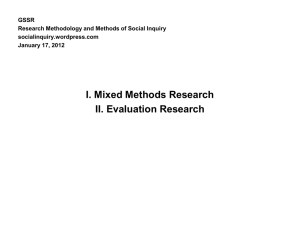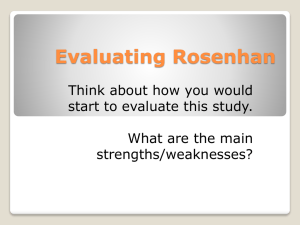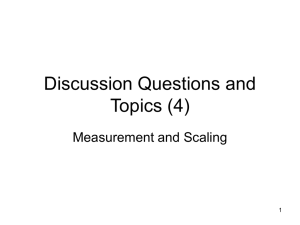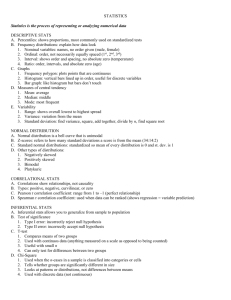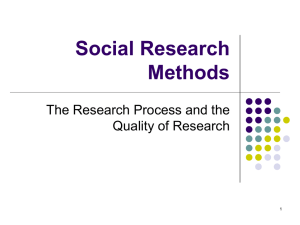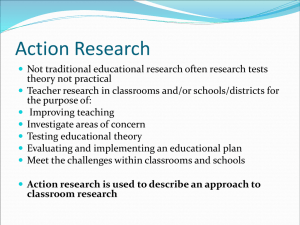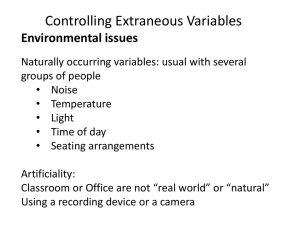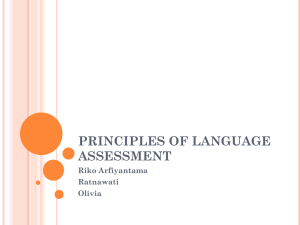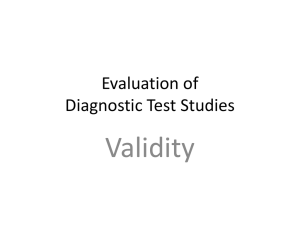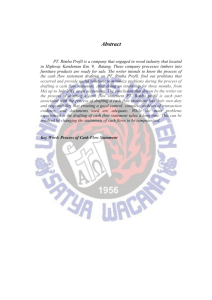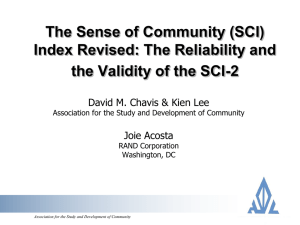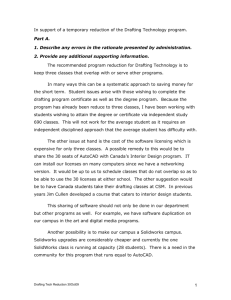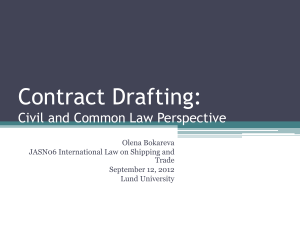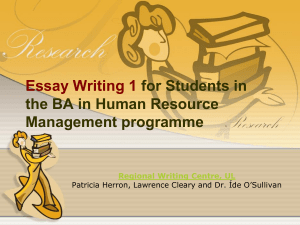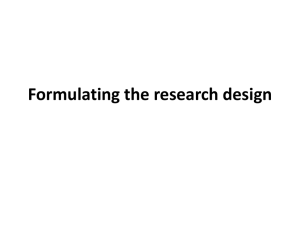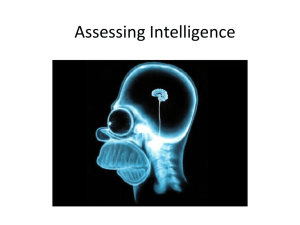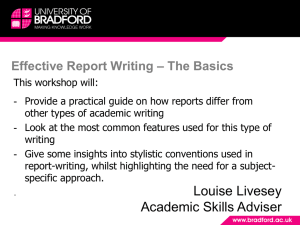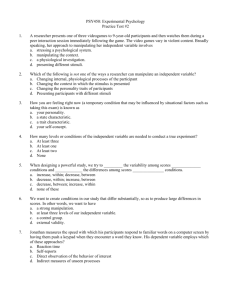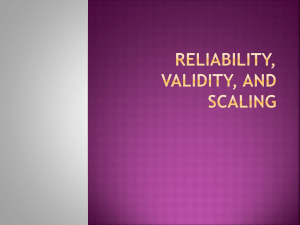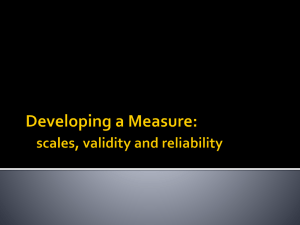research eport writing
advertisement
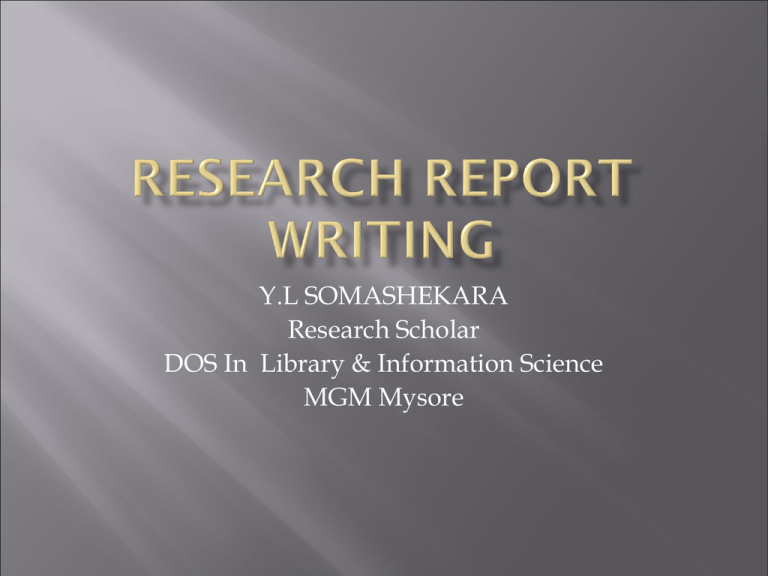
Y.L SOMASHEKARA Research Scholar DOS In Library & Information Science MGM Mysore Research report writing is the oral or written presentation of the evidence and the findings in such detail and form as to be readily understood and accessed by the reader and as to enable him to verify the validity of the conclusions.. According to American Marketing Society, Its purpose is to Convey to interested persons the whole result of study in sufficient detail and to enable each reader to comprehend the data and to determine himself the validity of the conclusions. It is covers, Disseminations, Presents the conclusions for the information and knowledge to others, to check the validity of the generalizations, to encourage others to carry on research on the same or allied problem. Generally, a research report, whether it is called dissertation or thesis 1) The Priliminary i.e. preface pages 2) The text of the report / Main body of the report 3) The Reference material. Title page Certification Candidate Declaration Preface including Acknowledgements Table of Content List of Tables List of figures List of Abbreviation 1.0 1.1 1.2 1.3 1.4 1.5 1.6 1.7 Introduction Background of the study Problem Statement Purpose and objective of the study Research Questions Definition of Terms Significant of the study Conclusion 2.0 Introduction 2.1 Body of the literature 2.1.1 General area of research 2.1.2 Underlying theory 2.1.3 Variables used from previous literature 2.2 Theoretical Framework 2.3 Hypotheses 2.4 Conclusion 3.0 3.1 3.2 3.3 3.4 3.5 3.6 Introduction Research Design Variable and Measurement Questionnaire design Population and Sample Scope of the study Data analysis method 3.6.1 Goodness of data 3.6.2 Inferential analysis 3.7 Conclusion 4.1 Introduction 4.2 Goodness of Measure 4.2.1 Representativeness of data 4.2.2 Validity test 4.2.3 Reliability test 4.3 Inferential analysis 4.3.1 Descriptive analysis 4.3.2 Test of difference 4.3.3 Test of relationship Correlation analysis Hypothesis testing 4.4 Conclusion 5.1 Recapitulation of major findings 5.2 Discussion 5.3 Implication 5.3.1 Theoretical Implication 5.3.2 Practical Implication 5.4 Limitation 5.5 Recommendation for future research 5.6 Conclusion The reference material is generally divided as fallows 1. Bibliography (APA Style or ..) 2. Appendices (SPSS output & Data Stream) 3. Glossary of terms (if any) 4. Index (if any) Technical Report: Popular Report The Report for the Administrator Oral Report 1) The Problems of Communications a. Technical terms should be properly explained. b. Neither too simple nor too difficult expression c. Level of Knowledge and subject-matter d. Language and drafting 2) The problem of objectivity . 3) The Problems of expression of bitter truths and unpleasant facts For preparations or drafting of reports three steps are involved. 1) First Draft: Comprehensiveness or fullness of facts. Precision or Accuracy of Facts Coherence or logic of facts, and Movement or transition of facts and ideas. 2nd. The researcher should give the first draft, at this stage, a shape so that it can be readable, clear and lucid. Considerable trimming or editing will have to be done to make the writing precise, Concise and brief. Finally, at the second draft stage, critical evaluation will have to be made of all that has been written-facts, findings, conclusions and recommendations. 3rd. And final The final stage in drafting is the preparations of final report. It concentrates mainly on the finish and final touches, i.e., on documentation and polish to make the report weighty, authoritative, convincing and attractive. Documentation indicated the references to the sources, other previous and current work and view, additional data and discussion and suggested further reading on the specific problem as handled by the researcher. In other words, it indicated the thoroughness of the investigation and on the other a guide to further work. 1) Attractive 2) Clear Topic 3) Balanced Language 4) No repetition of facts 5) Statement of scientific facts 6) Practicability 7)Description of the difficulties and the shortcomings Review of literature Treatment of quotations Size and Physical Design Footnotes Use of Abbreviations Use of Statistics, Charts and Graphs Bibliography, Index & Appendices Conclusions: In spite of all that has been stated above, one should always keep in view the fact report-writing is an art which is learnt by practice and experience.
